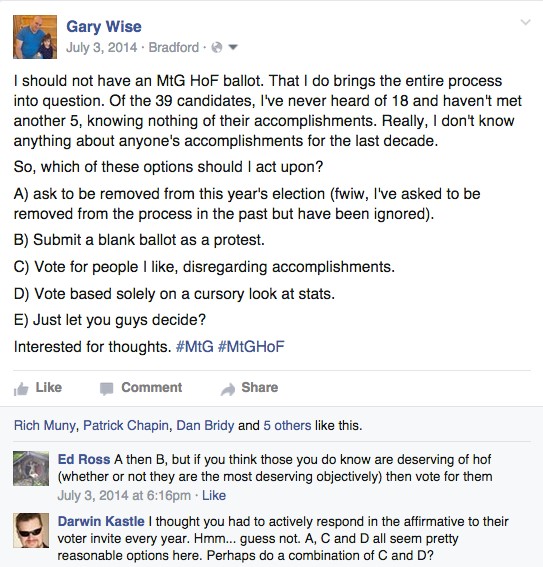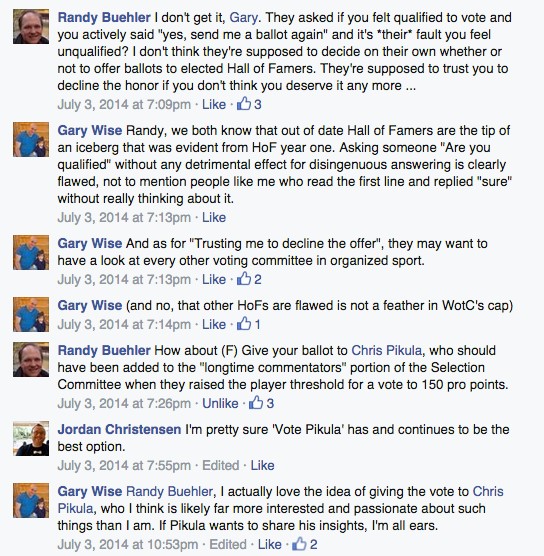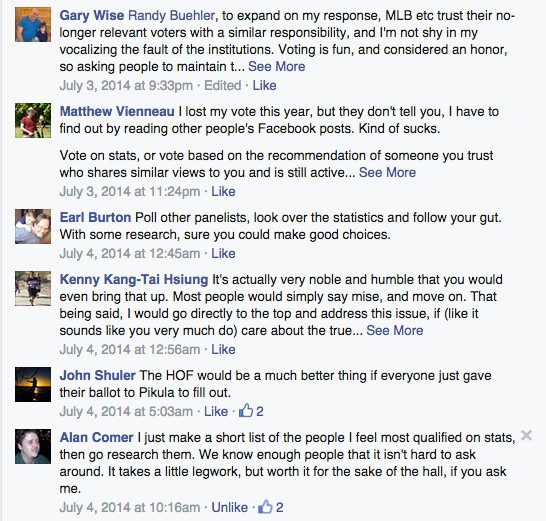OK, to start, a Facebook post from a year ago:

Later…


This wasn’t my finest moment. If I’m making excuses, an hour earlier I’d learned a friend had passed away, and I then received my ballot after having twice asked to not be included in the process for lack of information.* I wasn’t in my best frame of mind, and the attitude of the post and the following comments absolutely sucked… enough to draw a normally stoic former-WotC higher-up to write a deleted-because-not-on-MY-wall request that I drop off the face of the earth. I guess I inspire that sometimes.
* Of course, the lesson here is that you do not post on Facebook when you’re not exactly in control of your emotional functionality and virtual mouth attached to it.
After the furor died, a present WotC employee (who I respect and admire) reached out and asked me a few questions, included amongst them whether I’d like to be removed from the process altogether. I told him that was probably for the best (third time’s the charm?), which is why I was a little surprised to get my ballot this year. For my purposes, that’s not an entirely bad development; since flying to DC to have my face demolished, I’ve gotten a bit of the taste again. The winning-consumed force I was in my Pro days is gone, but the gamer in me is happy to be playing again and enjoying Magic as a game and a puzzle and a social opportunity. Gamers are gonna game, I guess and voters are gonna vote.
The question I should have posted with a lot less attitude was, “do you really want voters who aren’t totally immersed in the PT?” In those months since DC, I’ve heard murmurs about the Chapin-Ajani fiasco (one of those unfortunate mistakes that we can’t learn from until they’re made) and the Zach Jesse banning (I’d need another 5,000 words), but the fact I’d never heard of Zach Jesse or Drew Levin (names I still had to look up to include here) surely suggests I’m not entirely qualified to vote, doesn’t it? Darwin and Randy were right in their Facebook comments that I had the option to just give up my vote, but Hall voters in any sport are pretty notorious for clinging to what they’ve been given and I still can’t think that asking them to put reason and objectivity ahead of self-importance and self-interest is a logically reasonable approach.
What’s the solution? I’m the hypocrite who’s still far enough removed that I don’t have a perfect one, though even minor quality control has to be an option. How about sending an annual two-minute questionnaire to potential voters asking a series of questions like:
- Has Mark Herberholz won a Pro Tour?
- Has Tsuyoshi Ikeda played in more than 40 Pro Tours?
- Does Matthew Sperling have a strong community presence?
- Is Eric Froehlich’s sunny disposition an impediment?
- Is Osyp Lebedowicz almost too good at dancing?
OK, maybe the last one is a little too inside and from too long ago, but you get my point: shouldn’t there be a higher standard to determine whether WotC should be giving away thousands of dollars per year for life than “I used to know stuff”?
One conversation I had that really struck a chord was initiated by Christian Calcano and came to a head for me with Ben Stark. My numbers were included in a sampling of non-Finkel/Budde types who collectively set the bar for what a Hall of Fame career looks like. When I suggested that I probably shouldn’t have been in that grouping because play alone wouldn’t have gotten me in, Ben said the following (cleaned up for non-Facebook English):
“Neither would I, Gary. I got in because of my brand as the draft guy with my reasonable stats. Huey got in because of everyone’s accurate regard for him as one of the best all-time players with his reasonable stats. All of our little bonuses are nice, but if you remove the outliers, a Hall of Fame resume looks roughly like our stats.”
I really liked that and see the truth of it. The reality is, when you look at the stats, there aren’t many hard lines to draw. In baseball parlance, is there really a difference between 500 home runs and 499? No, that’s pretty arbitrary (more on arbitrary cutoffs in a bit). The things that differentiate a HoF career require the voter to understand who the candidates were as all-around contributors, as players, as writers, as whatever it is that made their candidacy three-dimensional. The questionnaire would ensure that a high percentage of the voters would at least be aware of those things that transcend the numbers.
Sure, people could lie or Google with foresight of what incorrect answers mean, but I wouldn’t and I’m sure there are others of whom the same could be said, and if nothing else, you’re increasing the minimal level of engagement, all of which has to improve the quality of the process. Paul Rietzl been going on and on in my newsfeed about being a small-Hall guy; I am too, but more in the realm of voters than votees. Maybe Chris Pikula should just be picking Hall of Famers after all.
For the time being, I have a vote and for reasons outlined earlier, I’m using it, with one big question defining my ballot:
Which is more important? Keeping the hall small to A) heighten the level of prestige that comes with entry and B) respect the fact that reduced expense in the number of Hall of Famers increases the chance I’ll still enjoy these benefits ten years down the line?** Or letting Hall numbers balloon to share the joy and pleasure of Hall of Fame enshrinement that also allows for a heightened possibility that I’ll get to see enshrined friends down the line?
OK, the point about the potential for shutting down the HoF rewards is pretty extreme, and from what I can tell there’s no threat of that happening any time soon… but it’s a nice demonstration of the conflicts of interest we’re looking at here. I so often hear other HoFs invoked when discussion of this one flares up, but #MTGHOF is largely defined by the one difference that there’s so much at stake. Magic players will probably never make the millions pro athletes do, which means having your career funded by WotC is huge. Enshrinement for us is worth a lot more than pride.
Now, try being a voter and telling a lot of gaming-loving-gamers “I’m sorry, I just don’t believe you’re worthy of having $75,000 handed to you over the next decade, so I’m leaving a slot blank.”
There was a time when my iron-tight views on the integrity of the game would have allowed me to do that. Keeping the Hall exclusive heightens the esteem its membership brings and is great way to really show the masses of the future who was who. That time is gone and so is that guy, replaced by one with a softer countenance who likes the idea of seeing years of gaming rewarded with more opportunities to game. That’s how I came to the ballot I did: I decided I didn’t want to be that guy.
The criteria offered by WotC asks that we vote based on:
- Player performance
- Playing ability
- Integrity
- Sportsmanship
- Contributions to the game in general.
It says nothing about exclusivity and since there’s always someone who’s closest to the arbitrary cutoff, I’m choosing the less-arbitrary cutoff of logistical limitations. I’m allowed five votes, and I’m submitting five votes knowing that most of them have little chance of doing much:
1) Eric Froehlich
2) Justin Gary
3) Tsuyoshi Ikeda
4) Osyp Lebedowicz
5) Shouta Yasooka
EFro is the easy vote. He’s clearly a community contributor just through constantly being active in social media, bringing major issues to the forefront, and that’s a nice extra divot at the end of an impressive resume. He’s going to get in this year. You can read more about him then. For me, the shoo-in doesn’t make for interesting writing fodder.
I think the really interesting discussion this year centers on Justin Gary. I’ve always been an advocate of Justin’s inclusion. There were times when I didn’t vote for him because there were more than enough qualified candidates and it made sense to game the system, but I always knew he was the caliber of player whose inclusion I couldn’t argue against.
EFro is the easiest candidate here, but Justin was the one guy in this year’s vote who I knew had me completely outgunned when we played. He was just a better player than I was, and there just weren’t a whole lot of guys about whom I could make that kind of a definitive statement. That’s not to say EFro wasn’t a better professional player than me back then (he obviously turned out that way), but if he was, that reality didn’t make itself blatantly obvious the way it did with Justin. I’d play Justin and watch him outmaneuver me in slow motion. I’d fire sluggish, hapless bullets and he’d do this, all the while continuing to come at me with an endless barrage of pain. Justin was probably one of the ten best players in the world and it absolutely showed that I wasn’t when he played me.
To me, the difference in voter perception between Justin and Eric is the similarity of their records; the numbers really aren’t all that different:

Pretty clearly EFro had the better results, but it’s equally clear Justin belongs in the same conversation. EFro did it in a tougher era where MTGO evened the playing field, but Justin enjoyed the same kind of dominance as Eric did and there’s no question that outside of Hall of Famers, there’s just aren’t guys who enjoyed prolonged relative dominance the way these two did.
If you’re really looking at those numbers, the difference is less than five match wins over a PT career, right? That probably works out to about a 1% difference in match win percentage. Take those five extra Top 32s Justin has, add a win to three of them and two wins to one, and suddenly Justin has superior head-to-head numbers. That’s one heck of a “What If?”, but it’s certainly comfortably within the realm of potential variance in a game where bad draws happen, and it illustrates that if EFro is this year’s one surefire Hall of Famer (as a lot of people make him out to be), you have to at least give Justin’s candidacy some serious consideration.
The thing that always impressed me about Justin was the consistency. Twenty Top 32s in 44 tries is, in a word, insane. This was back when there were Limited-specific Pro Tours and with them successful professional Limited specialists, meaning Justin needed to be equally adept at both Limited and Constructed in order to build the numbers he did. Guys like me wouldn’t have had much of a PT record if asked to play Constructed every time out, and there were even more “Constructed specialists”** out there would have died in the Limited rounds if there were any. It’s tough enough to stay on top of both Standard and Modern, but at least they only ask you to bring one set of skills. Playing in those specialty-laden fields, Justin still managed to piece together Top 32 after Top 32 in what (it says here) builds up to a Hall of Fame career.
** Read: people who had no clue how to draft.
The one thought Justin’s candidacy keeps bringing me to is the arbitrary nature of rewards and whether they account for too much of our HoF thinking and our general esteem. Is it more impressive to go 10-4 in both of two tournaments? Or is it better to go 11-3 in one and 7-7 in the other? The latter example makes more money; they get a Top Eight and a big prize and Pro Point jump, and the potential to play more matches for even more prize and point jumps, but I’m not sure it’s the more impressive feat. Along the same lines, getaway times mean it makes a lot of logistic sense for WotC to only have the Top Eight play on Sunday, but let’s say for the moment that they’d decided on Top Sixteen Sundays instead of Top Eights? It’s not that out of the realm of possibility, is it? It’s not like we remember the guys who finished first in the swiss.
The difference between eighth and ninth, sixteenth and seventeenth, are usually percentage points, not match points, and it’s tough for me to believe that finishing on the right side of that dividing line really makes you the better player. That means that one of the things I’m looking for in defining a level of superiority is proof of prolonged excellence. When you look at the numbers, there’s no doubt which side Justin fell on.
The last question of Justin’s candidacy is the integrity one. Early in his career, a teenage Justin had a morally questionable episode while playing against a member of Team Deadguy. Deadguy, for those who weren’t around, were the good guys during the Mike Long era, and other than Long, the best-branded team in the game with mouthpieces to match. They believed in fair play and rules (good things obviously) and were widely adored and listened to, so when they recounted the details (which are fuzzy enough that I don’t want to try to recount them here myself), the world listened. For a lot of people, the episode branded a few choice scarlet letters on Justin’s forehead.
While that incident isn’t irrelevant, it came awfully early in Justin’s career, when he was very young. I never heard any other direct accusations of foul play after that on his part during a long, long career that eventually saw WotC trust Justin with stage production duties during PT Top Eight filming. Ultimately, while the record isn’t perfect, I’m inclined to treat that incident as a youth thing. I think it probably helped Justin grow up in a lot of ways. Because of that, while there are players in this class who I didn’t seriously consider because of their sketchy play histories, Justin wasn’t one of them.
If I were doing the Small Hall thing, this is where I’d draw the line. These two set the bar and the rest of the candidates aren’t all that close. Edel and Martell have really impressive records, but their longevity falls short and I don’t know their intangibles the way Stark did Billy Jensen’s. Saito and Juza have impressive career numbers, but I’ve never been much for using Grand Prix to judge Pro Tour success and there are obvious questions that are part of Saito’s record. I’m a big fan of guys like Andrew Cuneo and Gerard Fabiano, great personalities who bring a distinctiveness to their games, but each lacks something on the top end. Sam Black needs to get those one or two more notches on his gaming belt first, and will get enshrined when he (seemingly inevitably) does.
Ultimately, for my last three votes, I went with the defined criteria with a nod towards intangibles that made them stand out for me. Truth be told, I don’t expect Osyp, Ikeda, or Shouta to get in, but a few things stood out to me about them:
- Osyp cashed more often then he didn’t. The only candidates who cashed more often with 30 or more PT appearances are EFro and Justin. In his time, he was also a pretty central cog in the community, one of Magic’s best bloggers, and one who didn’t make the mistake of forgetting that fun was the crux of the thing.
- Tsuyoshi has played in 59 (59!!!) PTs, and that kind of perseverance plays for me. Coming from Japan, that’s a lot of airfare. His actual play level would probably be in the bottom half of the HoF, but he gets points for being a major builder of Magic in Japan, obviously an important community.
- Yasooka comes just short of that 50% cash rate, but the GP record is impressive enough to act as an intangible in a 403 PT point career. Mark Herberholz was my other option, but voting for him at a 200 PT point disadvantage would have been tough. At least the mention got you this video though:
So those are my votes. I’d sure love for you to sound off here or even to my twitter account @GaryWise1, because, you know, I must be wrong in there somewhere.
One last thing before I shut this down. With the itch to play I mentioned earlier has come an interest in writing about Magic. At GP Toronto, I was supposed to do a Q&A where I was prepared to answer questions on just about anything. Nothing was to be taboo, from some of my more colorful incidents to Mike Long to the PT Hall or how to get better as a Magic player. Really, anything anyone wanted to mention.
Well, since the Q&A never went off, I’m going to put this right here:
That is my email address and I’m inviting you to submit requests for topics to discuss. I’m probably not going to answer every email or get to all of the topics, but if I read your question and my mind starts spinning its wheels, that might mean more of me writing about Magic. It could be fun for both of us.
I’ll be back with another of these after getting leg-dropped in Vancouver.
